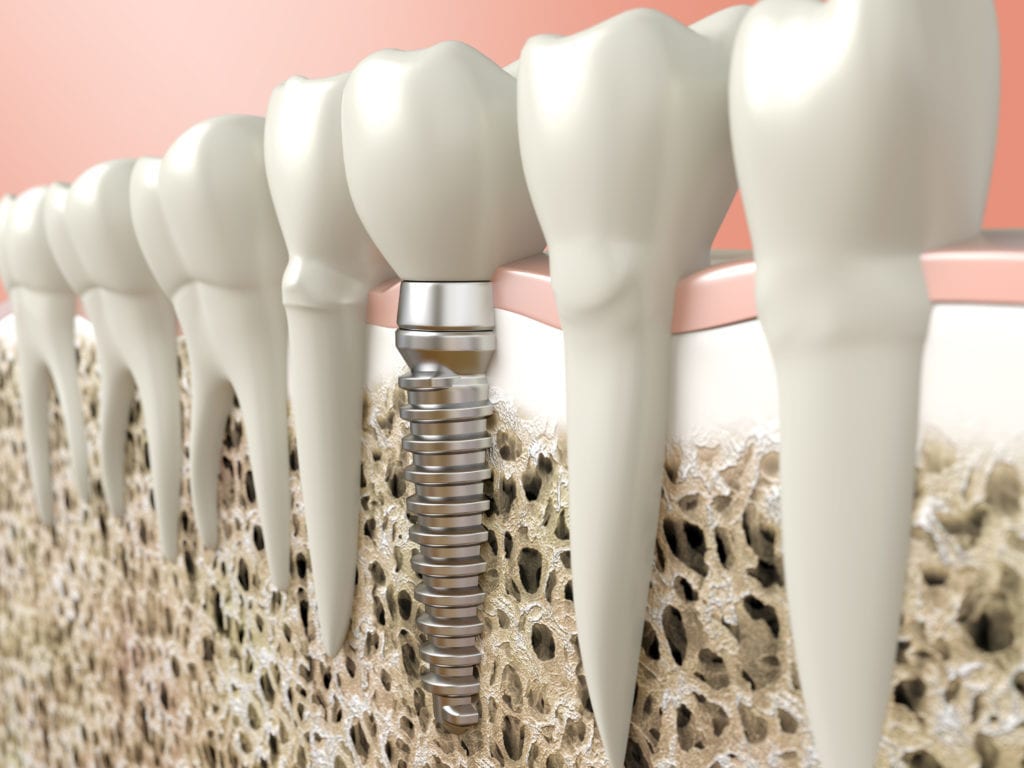Dr. Amy Marckese at DentalSpa provides patients with quality dental implants under one roof at her Indianapolis, IN dentist office. She will meet with you to thoroughly evaluate your dental health and discuss your cosmetic goals to ensure that dental implants are right for you.
If you qualify for dental implants, Dr. Marckese will first create a personalized treatment plan. The dental implant procedure, from evaluation to securing the dental restoration, usually takes five to eight months, and most patients don’t experience a disruption to their daily lives.
The process time may take longer if treatments are necessary before your implant surgery. People who require a bone graft or gum disease treatment will need to address those issues first. Extra healing time will be require and that will extend the total process time-frame.
Our dentist in Indianapolis, IN is able to perform a majority of the procedures for dental implant in Indianapolis, IN at her dentist office. A small number of cases are referred to specialists to have the dental implant placed.

Dental Implant Procedure
The process takes place in three phases; dental exam and creation of treatment plan, surgical implantation of the implant and attachment of the replacement tooth.
Consultation and Treatment Planning
Dental implant planning is very meticulous. Dr. Marckese will begin with an exam to assess your oral health, review your medical history, and discuss your expectations. She will need images of your jawbone to determine if there is enough bone mass to support the implant fixtures.
If you qualify for implant treatment, Dr. Marckese will plan your entire treatment from how many dental implants you need to the type of dental restoration you need. Having a clear treatment plan is key to a successful dental implant treatment.
Surgical Placement of Implant Fixture
If a tooth extraction is needed, that will be performed first. Then Dr. Marckese will surgically place the dental implant, a tiny titanium post, into the bone at her Indianapolis, IN dentist office.
Using the treatment plan as a guide, she will make a small incision in the gums to expose the jawbone. A specialized drill is then used to create a hole in the bone for the implant fixture. Dr. Marckese will then carefully place it in the prepared site. She will close the wound with sutures.
The body initiates the process of osseointegration. This is where the titanium post will fuse with the jaw bone for a permanent bond that will support natural bone regeneration. It can take anywhere from 3 – 5 months to complete.
Placing the Abutment
Once osseointegration is complete, the next step is to prepare the implant for the permanent dental restoration. The first step of this is place the an abutment on each dental implant. The abutment is a small connector piece serves as the base for the new dental restoration. It transfers the load from the prosthesis to the implants. Abutments also provide support and stability for the prosthetic teeth.
The abutment placement requires another minor surgery. Dr. Marckese will reopen the gum tissue to expose the top of each implant. She will screw or cement each abutment onto the implants.
If screwed onto the implant, the connection is usually very secure and allows for easier removal if necessary, such as for repairs. A cemented abutment is more affordable but more complex to remove.
After the abutments are in place, Dr. Marckese may place a healing cap over them to help the gum tissue heal in an ideal shape for the new tooth. This phase can last a few weeks, allowing the gums to form correctly around the abutment.
Restoring the Dental Implants
The next step is to restore the dental implants. Once your gums have healed from the abutment surgery, Dr. Marckese will take dental impressions of the mouth. We will use the impressions to fabricate your custom prosthetic teeth.
Dr. Marckese will design a dental restoration that matches the shape, size, and color of your natural teeth. If you are missing a single tooth, you will receive a dental crown, or if you are missing multiple teeth, a dental bridge or denture.
When your custom-made prosthetic teeth are ready, she will secure them to the abutments. Dr. Marckese will carefully check the fit, aesthetics, and functionality to ensure the restoration integrates with your smile. Once satisfied, she will secure it to the abutments.
How can I prepare for my dental implant surgery?
Preparing for dental implant surgery will ensure the procedure goes smoothly. We have prepared a few guidelines that you should follow to ensure for a successful surgery.
- Provide your dentist with a complete list of medication you’re currently taking
- Take any antibiotics prior to surgery if prescribed
- Do not eat or drink anything after midnight the night before your surgery
- Brush and floss thoroughly on the day of the surgery
- Arrange for transportation to and from your appointment
- Stock up on soft foods and pain relievers
- If you smoke, we highly suggest that you stop because it will affect your ability to heal and compromise the success of your dental implant
Dental Implants: Aftercare
Dental implant aftercare is vital for your new smile’s long-term success and health. After surgery, you need to follow the aftercare instructions. These are specific for each patient since no two dental implant patients are alike.
Manage swelling and discomfort with ice packs and pain relievers as prescribed. A soft diet is necessary for a few days to avoid stress on the implant sites. You should only add back normal foods into your diet when you feel comfortable or when your dentist says it is okay.
Avoid hard and sticky foods and hot drinks or food. Consuming these things can damage the sutures, strain the implant during the initial healing, or impede the wound healing.
Once you have dental implants surgically placed, you should avoid tobacco and alcohol. They can delay the healing process.
Proper oral hygiene is key immediately following surgery and in the long term. After surgery, gently brush the implant site, avoiding direct contact with the surgical area. Use the prescribed antimicrobial rinse as directed. Floss carefully to prevent infection and ensure cleanliness around the implant.
Once healed, maintain proper oral hygiene to ensure the longevity of your dental implants. Follow the guidelines for caring for your dental restoration to keep it functioning. Attend all your routine dental appointments to maintain good oral health and catch any issues with your dental implants in the early stages.
